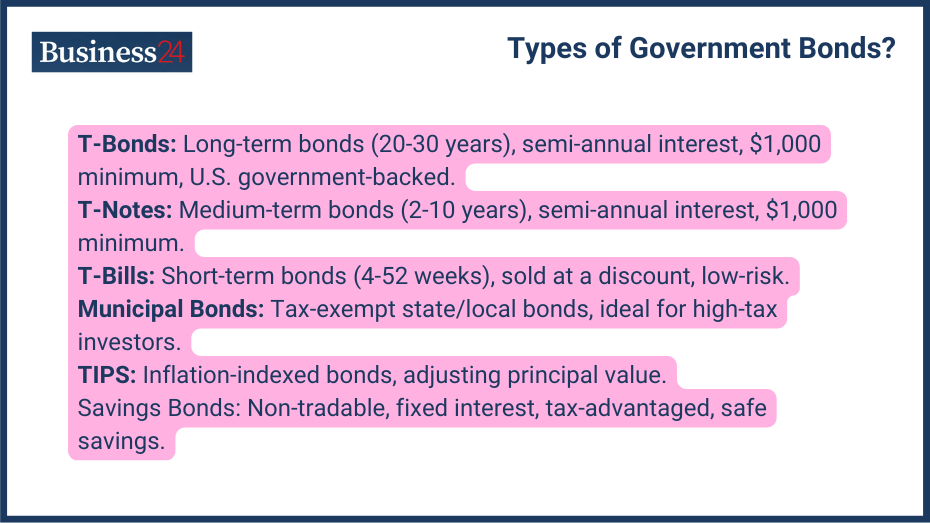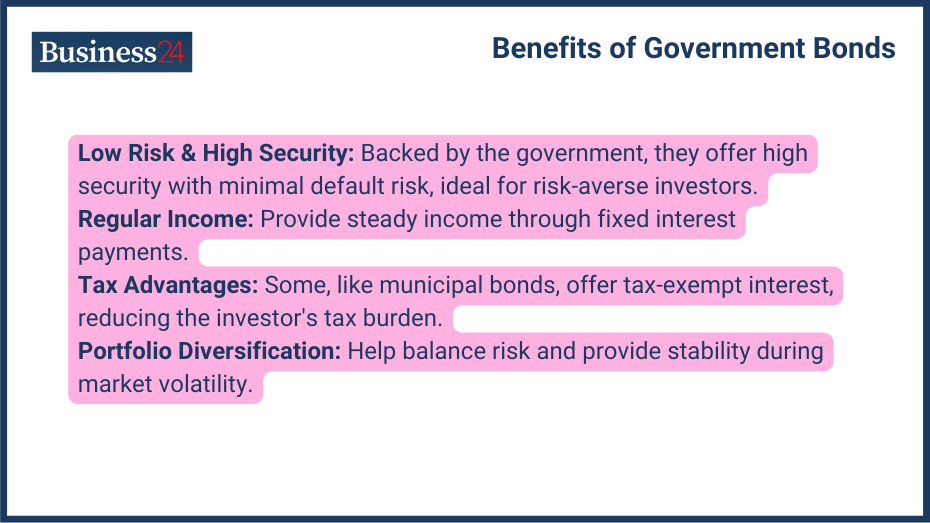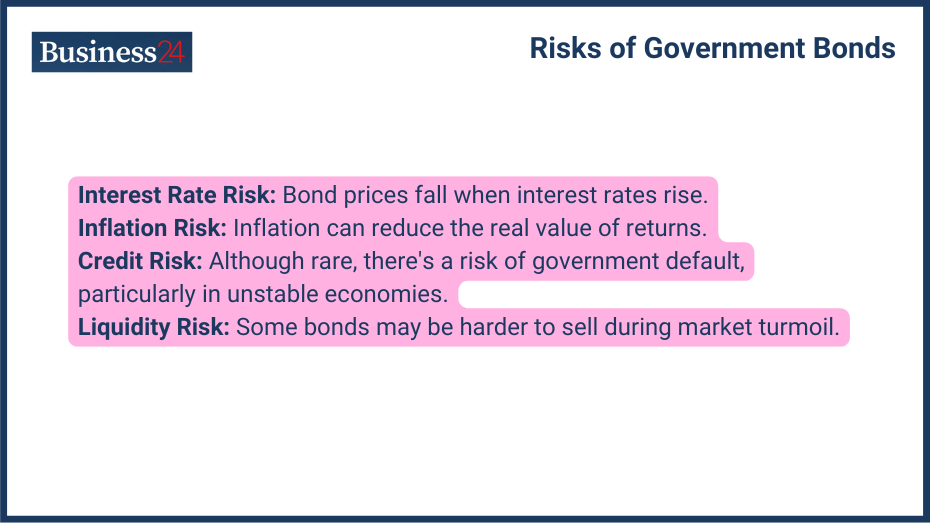
Government bonds are issued by federal, state, or local governments to raise debt capital. Learn how these secure investments can diversify your portfolio and support public projects.
Bonds are versatile instruments issued by various entities, such as small companies, large companies, municipal corporations, federal, etc., to raise funding for various kinds of work. Similarly, a government bond is a debt security issued by a government entity, such as a municipal, state, or federal government. Governments use them to raise funds for various projects and initiatives.
Government bonds represent a loan from an investor to a government entity. In return for the loan, the investor receives regular interest payments and the bond’s principal amount at maturity. Government bonds are considered relatively safe investments due to the stability and financial strength of governments.
How do Government Bonds work?
The workings of a government bond are simple: the government issues these bonds and takes money from the investors. In return, you receive regular interest payments, typically paid semi-annually or annually. The government uses the funds to finance various projects and initiatives, such as infrastructure, education, or defense. At the maturity date of the bond, you receive the principal amount of your investment back.
Everything has pros and cons; compared to corporate bonds, government bonds are safer because the government is less likely to default on its debt. But, the tradeoff is the return, with government bonds returning lower than corporate bonds.
Are government bonds a good investment?
For a conservative investor who is happy with the low return but substantially low risk, government bonds are a good investment. However, depending on their risk tolerance and investment goals, they may only suit some investors.
What happens when you invest in government bonds?
When you invest in government bonds, you lend your money to the government. In return, you receive regular interest payments and the principal amount of your investment at maturity. You are providing the government with a loan, and the government is obligated to repay you the principal amount of your investment at a specified maturity date.
What are the Types of Government Bonds?

There are various types of government bonds:
- Treasury Bonds (T-Bonds): Treasury bonds are long-term government bonds that mature in 20, 30, or 30 years. They pay interest semi-annually and have a minimum denomination of $1,000. T-bonds are considered among the safest investments available, as the full faith and credit of the U.S. government backs them.
- Treasury Notes (T-Notes): Treasury notes pay interest semi-annually have a minimum denomination of $1,000, and are medium-term government bonds that mature in 2 to 10 years. T-notes are a popular investment option for investors seeking a balance of risk and return.
- Treasury Bills (T-Bills): Treasury bills are sold at a discount and mature at face value, earning interest through the difference between the purchase price and the face value. T-bills are a relatively low-risk investment option often used as a safe haven for investors during market uncertainty. Short-term government bonds mature in 4, 13, 26, or 52 weeks.
- Municipal Bonds: Municipal bonds are issued by state, local, or territorial governments. The interest earned on municipal bonds is often exempt from federal income tax and may be exempt from state and local taxes. This tax advantage makes municipal bonds particularly attractive to investors in high-tax brackets. Different types of municipal bonds exist, including general obligation and revenue bonds.
- Inflation-Protected Securities (TIPS): Inflation-protected securities (TIPS) are government bonds indexed to inflation. This means that the bond’s principal amount adjusts based on changes in the Consumer Price Index (CPI). This protects against inflation risk as the bond’s value and cost of living increase. TIPS are a popular investment option for investors concerned about the eroding purchasing power of their investments due to inflation.
- Savings Bonds: Savings bonds are non-marketable government bonds that cannot be traded on the secondary market. They are typically purchased at a discount to face value and mature at face value. Savings bonds offer fixed interest rates and may be exempt from federal income tax. There are different savings bonds, including EE and I bonds. Savings bonds are a popular investment option for individuals looking for a safe and simple way to save money.
What are the Benefits of Government Bonds?

Here are some of the benefits of government bonds:
- Low Risk and High Security: Government bonds are generally considered among the safest investments available, as the full faith and credit of the issuing government backs them. This means there is a very low risk of default, making government bonds a suitable option for risk-averse investors.
- Regular Interest Payments: The best benefit of bonds is that they offer regular income; government bonds offer regular interest payments, providing a steady income stream for investors. The interest rate on a government bond is usually fixed, which means that investors can count on receiving a predictable amount of income each year.
- Tax Advantages: Interest earned on certain government bonds, such as municipal bonds, may be exempt from federal income tax and state or local taxes. This can significantly reduce the overall tax burden for investors who hold these bonds.
- Portfolio Diversification: Government bonds can diversify your investment portfolio and reduce overall risk. By including government bonds in your portfolio, you can balance the risk and return of your investments. Government bonds can provide stability and balance to your portfolio, especially during market volatility.
What are the Risks of Government Bonds?

Risks associated with government bonds are:
- Interest Rate Risk: Interest rate changes can affect the market price of government bonds. When interest rates rise, the market value of existing bonds typically falls, and vice versa. This is because investors demand higher interest rates for new bonds issued at higher interest rates.
- Inflation Risk: Inflation can erode the purchasing power of fixed-income investments like government bonds. If inflation rises faster than the interest rate on a government bond, the real return (adjusted for inflation) may be negative. This means that the purchasing power of the interest payments and the principal amount of the bond may decline over time.
- Credit Risk (Sovereign Risk): While governments are generally considered less likely to default on their debt than corporations, there is still a risk of default, especially for governments with weaker economies or political instability. This risk is known as sovereign risk. If a government defaults on its debt, investors may lose some or all of their investment.
- Liquidity Risk: The liquidity of government bonds can vary depending on market conditions. Some government bonds may be more difficult to buy or sell than others, especially during market volatility or economic uncertainty. This liquidity risk can affect the price of the bond and the ease with which investors can exit their investment.
What is the Process of Buying and Selling Government Bonds?
How to Buy Government Bonds
You can purchase government bonds from the U.S. Treasury Department through the TreasuryDirect online platform. This lets you buy and sell Treasury bills, notes, and bonds directly from the issuer. Alternatively, you can buy and sell government bonds through a brokerage firm. Brokerages provide access to a wider range of government bonds and offer additional services like research and investment advice.
Primary vs. Secondary Market:
Government bonds can be purchased in the primary market when the government initially issues them. This is known as a new issue. You can also buy and sell government bonds in the secondary market, which involves trading existing bonds with other investors. The secondary market offers more flexibility and liquidity compared to the primary market.
Bond Auctions
The government conducts regular auctions to sell new government bonds. Investors submit bids for the bonds, and the highest bidders are awarded the bonds. Auctions can be competitive, especially for popular bond issues.
Trading Government Bonds
Government bonds are traded on the secondary market, allowing investors to buy and sell existing bonds. Market makers facilitate trading by providing bids and ask quotes. The bid price is the price at which a market maker is willing to buy a bond, while the asking price is the price at which they are willing to sell a bond. The difference between the bid and ask prices is known as the bid-ask spread.
What is the Role of Government Bonds in a Portfolio?
Role of government bonds in the portfolio of an investor:
- Asset Allocation: Government bonds can help to diversify your investment portfolio, reducing overall risk. By including government bonds in your portfolio, you can balance the risk and return of your investments. Government bonds can provide stability and balance to your portfolio, especially during market volatility.
- Risk Management: Government bonds are often considered a haven asset, providing stability during economic downturns. This means that they can help protect your portfolio from losses during market turmoil. Government bonds can also be used to hedge against market risk or inflation risk.
- Income Generation: Government bonds offer regular interest payments, providing a steady income stream. This can be particularly beneficial for investors seeking a regular source of income, such as retirees or individuals saving for specific goals.
- Preservation of Capital: Government bonds are generally considered low-risk investments, making them suitable for preserving capital. This means that there is a low risk of losing your principal investment. Government bonds can be a good option for investors prioritizing capital preservation over high returns.
What are the Costs Associated with Government Bonds?
Following are the types of fees and other costs you can incur while dealing with government bonds:
- Bid-Ask Spreads
The bid-ask spread is the difference between the price a market maker is willing to buy a bond (bid price) and the price at which they are willing to sell a bond (ask price). A wider bid-ask spread can increase transaction costs, as you may pay a higher price to buy the bond or receive a lower price when you sell it. The market maker is profiting from the difference between the bid and ask prices.
- Management Fees
Some government bond funds may charge management fees. These fees cover the fund’s costs, such as research, analysis, and portfolio management. If you invest in a government bond fund, you will be subject to these fees, which can reduce your overall returns.
- Transaction Costs
You may incur transaction costs, such as brokerage fees when buying or selling government bonds. These fees can vary depending on the trade size, the brokerage firm you use, and market conditions. Larger trades and more active trading can result in higher transaction costs.
- Opportunity Costs
Investing in government bonds involves an opportunity cost, as you may be forgoing higher potential returns from other investments. Government bonds are generally considered low-risk investments but may offer lower yields than other bonds or stocks. Government bonds may give up the potential for higher returns from riskier investments.
What are the Tax Implications of Government Bonds?
Tax implications of government bonds are:
- Tax Exemption on Interest: Interest earned on municipal bonds is generally exempt from federal income tax and may be exempt from state and local taxes. This tax exemption can significantly reduce your overall tax liability. However, it is important to note that the tax treatment of municipal bonds can vary depending on your state and local tax laws.
- Capital Gains Taxes: Capital gains from selling government bonds are subject to capital gains taxes. Short-term gains from bonds held for less than one year are taxed as ordinary income. Long-term gains from bonds held for more than one year may qualify for a lower capital gains tax rate. The holding period for capital gains purposes can vary depending on the type of bond and your investment strategy.
- Tax Treatment of Different Types of Bonds: The tax treatment of government bonds can vary depending on the type of bond. Treasury bonds, notes, and bills are subject to federal income tax but may be exempt from state and local taxes. Municipal bonds generally offer tax-exempt interest, while savings bonds may have different tax treatment depending on the type of bond and your eligibility.
Tax Strategies for Bond Investors:
- Tax-Deferred Accounts: To defer capital gains taxes, consider investing in government bonds through tax-deferred retirement accounts like IRAs or 401(k) plans.
- Tax-Loss Harvesting: If you have losses from other investments, you may be able to offset capital gains from government bonds through tax-loss harvesting.
FAQs
Q. How do government bonds compare to other fixed-income investments?
Government bonds generally offer lower returns than corporate or high-yield bonds due to their lower risk profile. However, they also provide greater stability and security.
Q. Are government bonds a good investment for retirement?
Government bonds can be a suitable investment for retirement due to their stable income and low risk. They can provide a steady income stream during retirement and help preserve your capital.
Q. What is the difference between a coupon bond and a zero-coupon bond?
Coupon bonds pay regular interest payments, while zero-coupon bonds are sold at a discount to face value and mature at face value. Zero-coupon bonds do not pay any interest during their life, but they are purchased at a discount to their face value, representing the interest earned.
Q. How can I evaluate the creditworthiness of a government bond issuer?
You can assess the creditworthiness of a government bond issuer by reviewing its credit rating and economic indicators. Credit rating agencies such as Moody’s, S&P Global, and Fitch Ratings provide ratings reflecting the issuer’s ability to repay debt.
Q. What is a government bond’s yield to maturity (YTM)?
The yield to maturity (YTM) is the total return an investor can expect to earn on a bond if held to maturity, considering the purchase price, interest payments, and any capital gains or losses. YTM is a measure of a bond’s overall return.
Disclaimer
eToro is a multi-asset platform which offers both investing in stocks and cryptoassets, as well as trading CFDs.
Please note that CFDs are complex instruments and come with a high risk of losing money rapidly due to leverage. 51% of retail investor accounts lose money when trading CFDs with this provider. You should consider whether you understand how CFDs work, and whether you can afford to take the high risk of losing your money
This communication is intended for information and educational purposes only and should not be considered investment advice or investment recommendation. Past performance is not an indication of future results.
Copy Trading does not amount to investment advice. The value of your investments may go up or down. Your capital is at risk.
Don’t invest unless you’re prepared to lose all the money you invest. This is a high-risk investment and you should not expect to be protected if something goes wrong. Take 2 mins to learn more
eToro USA LLC does not offer CFDs and makes no representation and assumes no liability as to the accuracy or completeness of the content of this publication, which has been prepared by our partner utilizing publicly available non-entity specific information about eToro.
